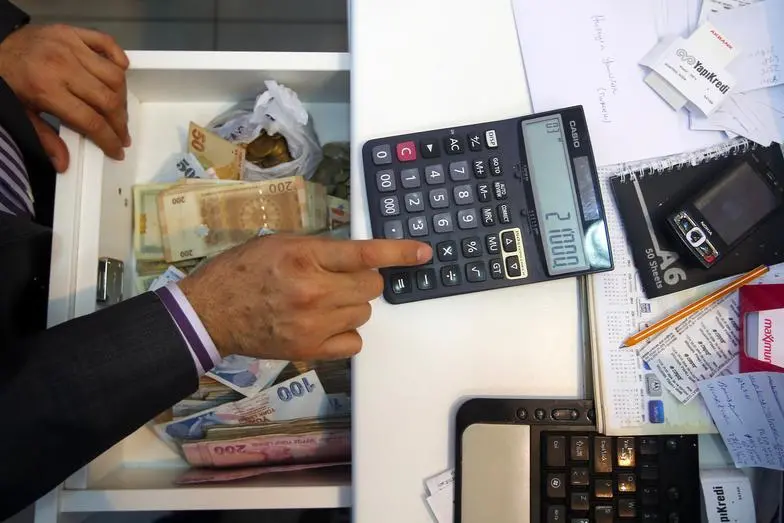PHOTO
ISTANBUL/ANKARA - Turkey's lira pulled back from a record low of 7.24 to the dollar on Monday after the central bank pledged to provide liquidity, but it remained under selling pressure and its meltdown caused further unease on global markets.
The currency has lost more than 40 percent against the dollar this year, largely due to worries about President Tayyip Erdogan's influence over the economy, his repeated calls for lower interest rates, and worsening ties with the United States.
On Friday the slide turned into a crash: the lira dropped as much as 18 percent, hitting U.S. and European stocks as investors took fright over banks' exposure to Turkey.
Another lira collapse on Sunday night hit Asian shares and drove global demand for the safe-haven dollar, Swiss franc and yen. Shares in Europe's major banks also fell. urn:newsml:reuters.com:*:nL4N1V41DI urn:newsml:reuters.com:*:nL5N1V413D
Analysts say the crisis has been a long time coming and reflects Turkey's refusal to raise interest rates to curb double-digit inflation and cool an overheated economy.
'TURKEY IS UNDER SIEGE'
Erdogan, rejecting economic fundamentals as the cause of lira weakness, said Turkey was the target of an economic war.
"The developments over recent weeks have shown that Turkey is under siege," he told a meeting of Turkish ambassadors. "It is clear that these attacks will continue for a while."
He also said he expected the exchange rate to return to a 'rational level' and that Turkey had an action plan in place.
In Berlin, German Chancellor Angela Merkel said "no one has an interest in an economic destabilisation in Turkey" and that Ankara should ensure the central bank's independence.
The bank, which surprised markets last month when it held interest rates despite the tumbling lira, announced measures on liquidity and reserves after Finance Minister Berat Albayrak said the economic action plan would start on Monday.
Bankers also said the central bank would meet banks' lira liquidity needs at the overnight rate of 19.25 percent -- 150 basis points above the benchmark weekly repo rate -- though it might not use the overnight funding on Monday because needs were low.
They said that could be the first step towards tightening policy via an interest rate corridor, an instrument used in previous years, rather than increasing the benchmark rate.
The reserve requirement moves will free up 10 billion lira, $6 billion, and $3 billion equivalent of gold liquidity in the financial system, the bank said. It also pledged to provide "all the liquidity banks need".
ACTIONS, NOT WORDS
The lira pared losses after Albayrak's comments and the central bank announcement, but dropped again during the day and traded at 6.978 per dollar at 1609 GMT.
Turkish bank shares fell to their lowest in dollar terms since November 2003 and their dollar bonds and sovereign dollar debt tumbled. Stocks dropped 4 percent, with the BIST blue-chip index down around 50 percent in dollar terms this year.
In an interview published on Sunday, Albayrak said the economic plan would ease investor concerns, stressing budget discipline and ruling out any seizure or conversion of dollar-denominated bank deposits into lira.
"We will be taking the necessary steps with our banks and banking watchdog in a speedy manner," he said.
Kuwaiti news agency KUNA said Albayrak held talks in the Gulf State with his Kuwaiti counterpart on Sunday evening about economic developments in Turkey, but said there was no discussion about supporting the Turkish currency.
Market analysts broadly welcomed Albayrak's published comments but said investors wanted action.
"Turkey needs a complete rebalancing of its economic business plan, and very sharp rate hikes and a strong commitment that the central bank will be independent," Credit Agricole's senior emerging markets strategist Guillaume Tresca said.
But a drastic rate hike was unlikely because of the damage it would do to Turkey's corporate sector, while capital controls would close off access to foreign exchange for companies already short of dollars, Tresca said.
Raphael Marechal, head portfolio manager, emerging markets, Nikko Asset Management Europe, said rate hikes might make things worse, given the stresses in the economy. "But it would send a signal to external investors and to the market that the central bank is concerned about inflation."
Speaking to Hurriyet newspaper, Albayrak echoed Erdogan -- his father-in-law -- describing the lira's weakness as "an attack". That view was shared by Adnan Bali, chief executive of Isbank, one of Turkey's top private banks, who said. "I cannot explain the point we have arrived with economic fundamentals."
The interior ministry said on Monday it was taking legal action against 346 social media accounts that had posted "provocative" comments about the weakening lira.
(Reporting by Daren Butler and Nevzat Devranoglu; Additional reporting by Nevzat Devranoglu in Ankara, Claire Milhench in London and Ghaida Ghantous in Dubai; Editing Dominic Evans, Catherine Evans and John Stonestreet) ((daren.butler@tr.com; +90-212-350 7053; Reuters Messaging: daren.butler.thomsonreuters.com@reuters.net))





















